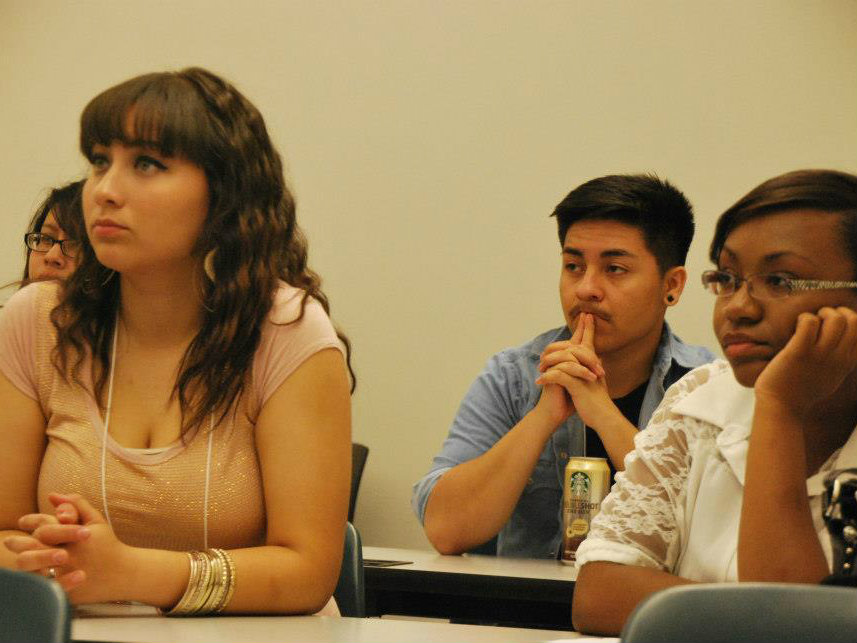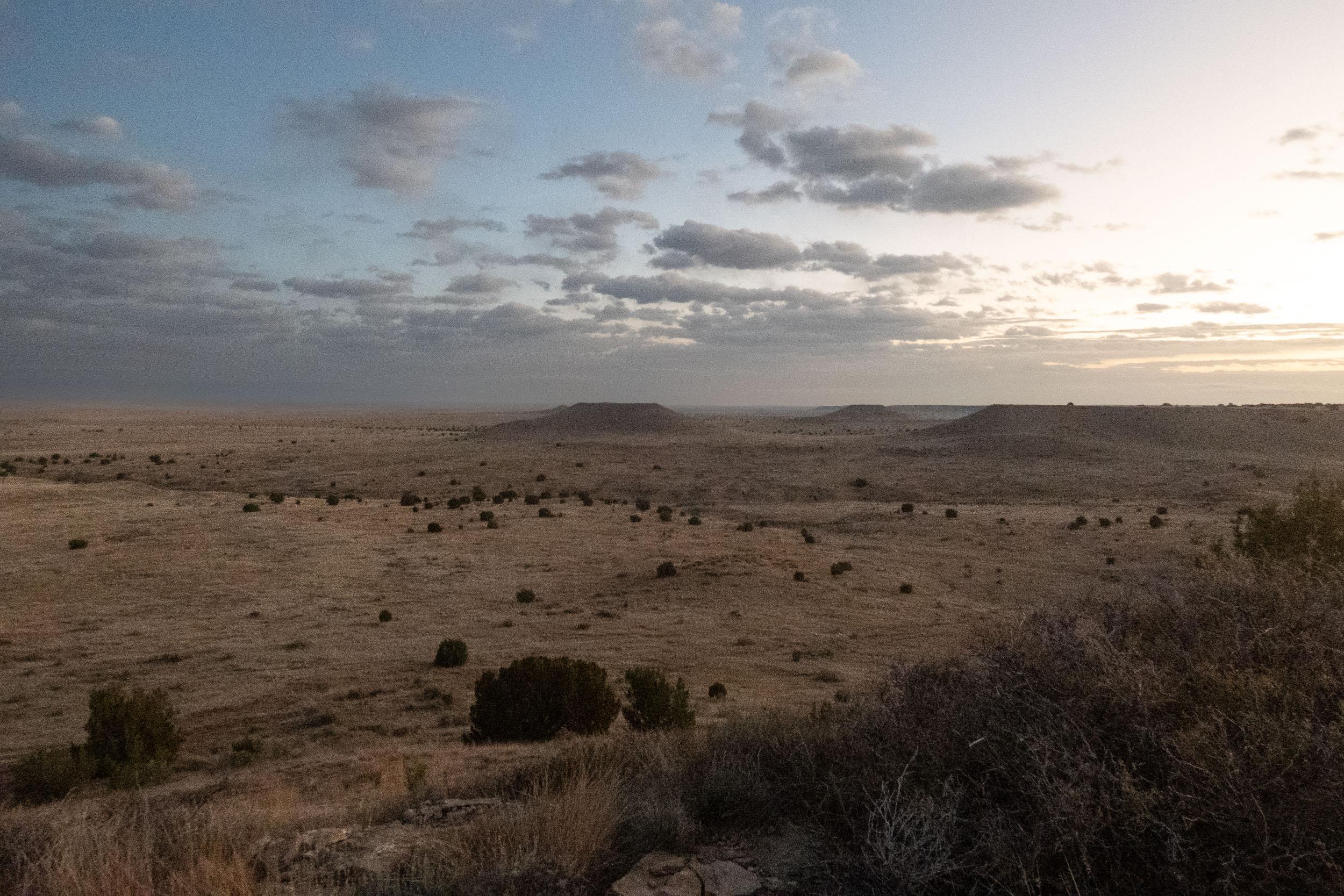
For many low-income students becoming the first in their family to go to college can be a herculean task. Especially if you are black or Latino, as we’ve reported in our series Losing Ground. These groups simply fall way behind whites when it comes to going to college. Today we continue our story about two students and the college preparation program that is trying to ensure they make it. CPR education reporter Jenny Brundin has more.
Here is a transcript of her report:
Reporter Jenny Brundin: Remember Ana Oaxaca? She’s the high school senior who got accepted to CU Boulder, but goofed up on her financial aid form and learned she wouldn’t get support she needed. We also met Jordan Jones-Potts. The 18-year-old has been accepted to dozens of college but doesn’t yet have the full-ride package he needs to seal the deal. For the past year, an intensive program - College Summit - has been preparing these students for the world of higher education. And there are a lot of obstacles.
Jesse Ramirez: When you live in a low income community, you’re not just dealing with academics and all that, you’re dealing with other real life issues.
Reporter: Jesse Ramirez is the program manager at College Summit.
Ramirez: And so what you see a lot of time is students may forget a piece of their application, especially around financial aid, sometimes parents get laid off from work....they hear a news story about student debt, so even though we’re empowering them, they’re still very fragile when it comes to this because it’s new to them.
Reporter: On this day, Jordan, Ana and 70 other students in College Summit are deep into the final “rap sessions” on transitioning to the hard reality of college and watching out for obstacles that could derail them. Facilitator Derek Canty talks about communicating with parents.
Derek Canty: Sometimes things are going on at school and you don’t want to what? Worry them. You might think they don’t. Trust me. I never thought they did, they do.
Reporter: Some of the parents, not having been to college themselves, have a lot of fear about their kids going away, and they don’t know how to help in the whole process of getting ready. That was true for Jordan and Ana.
Ana Oaxaca: The only thing she knows is that I’m going to college.
Reporter: Ana says her mom has a sixth grade education. She’s always cleaned houses.
Oaxaca: She doesn’t know how this process goes, how I’m dealing with it. I can’t ask her for any help.It’s hard to deal with that. But she knows that she supports me. She’s proud of me because I made it this far.
Reporter: Jordan knows the feeling. Still, just knowing that his parents are on his side is enough.
Jones-Potts: It’s very touching to see. Even though they may not even understand a bit of what I’m doing, they’re with me. And that’s what counts.
Ramirez: (talking about alcohol) And then it’s like ‘Oh, let’s get a 12-pack, and the let’s get a case....
Reporter: Other sessions today deal with tougher obstacles they’ll face – the kids break into groups and discuss case of what they may face: racism, drinking, over-committing. 18-year-old Jordan Jones-Potts, can relate to that last part. He listens intently as another student reads a case study about a student who gets involved in every committee, club, everything. In high school, she could handle it without her grades suffering.
Student and Jordan: OK! So, let’s start at square 1! This is my problem! This is the exact problem I have. (laugh)
Reporter: The mentors tell students as minorities on mostly white campuses, they’ll be asked to be on lots of committees and will need to draw the line, take care of themselves first. Facilitator Derek Canty:
Canty: Listen, the biggest that separates our students – first generation, students of color – it’s that our students go in there thinking that either we know or I’m right -- or, I don’t know and I’m not going to what? Students: Ask for help. Canty: Ask for help.
Reporter: He tells them it took him an entire year to ask for tutoring.
Canty: You have to start to demand what it is….that’s not from most of our cultures. It wasn’t from my culture to demand what I need!
Reporter: Self-doubt is just one obstacle - there are many others low-income students are vulnerable to: feeling alienated - from peers and family, not having the safety net their more affluent peers have, culture shock -- even the fear of success. Ryan Ross, who oversees student retention at the Community College of Denver, says programs targeting first generation minority students, are crucial.
Ryan Ross: Without these programs, the dismal numbers that we see would be even worse.
Reporter: But he and others estimate that only about 10 to 15 percent of students who need these bridge-to-college support services are getting them. There’s just not enough money. It costs College Summit about $200 per student each session. And it pays off. Drop out rates are high among first generation students. But 77% of College Summit graduates carry on for a second year. And Ryan Ross says, the investment has far-reaching effects, beyond the individual student.
Ross: The biggest thing is a lot of these students are going back to their neighborhoods where kids don’t believe college is for them and they’re seeing somebody from their neighborhood who grew up in the same trenches as them and they’re a college graduate and so the light turns on that, hey I can do this college thing too.
(sound of applause)
Reporter: Now the final meeting of College Summit is coming to a close. Each of the students tells the group their plans. Ana Oaxaca?
Oaxaca: My name is Ana Oaxaca and I’m enrolling into CU Boulder.
Reporter: Yes, after some frantic phone calls and correcting her mom’s tax forms, she got another letter. One from CU Boulder awarding her $15,000 dollars in scholarships.
Oaxaca: I know I’m going to go far. I know I’m going to make it to a point that I’m going to love my job, I love what I’m doing and I’m going to love my life.
Reporter: And Jordan Jones-Potts?
Jones-Potts: I don’t have a family who has money, so it’s hard....
Reporter: He’s getting a $35,000 dollar full-ride scholarship to Coe College in Iowa. It’s hard to imagine how deep Jordan must have had to dig into his own wells of stamina and hope to make it this far. Yet he’s clear on one thing. For kids like him, he says, this monumental journey wouldn’t happen without college-support programs and high school counselors.
Jones-Potts: To have programs like College Summit and people like Mr. Keaton, and everybody who invest time into me, to show me that they believe in me and believe I can be somebody is very touching and very powerful to me because I don’t necessarily have those role models, so when you have these different programs in place putting time into people like me, who may not know where they’re going to end up – it’s life changing.









